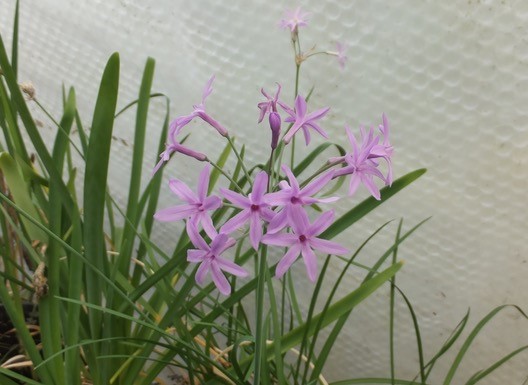
This curious genus of pretty onion like flowers from South Africa will both grace, and scent, your cool greenhouse though perhaps in ways you did not expect. Much grown outdoors in countries warmer than Britain and often along paths in the manner of chives this tuberous family also much resemble those Alliums in having garlic scented foliage. Fortunately unless the leaves are bruised this furtively comes and goes and is seldom offensive though can be disturbing until you realise where it’s coming from.
Be warned though, a few species such as T. alliaceae have specialised in fly pollination and so their attractive yellowish brown red spotted flowers really can smell quite offensive. On the other hand most such as the delightful T. violaceae have a delicate and pleasing perfume. This species has almost chive like foliage, pleasantly coloured in the variety Silver Lace thus its popularity for sub-tropical bedding. But their great value in the greenhouse is their length of flowering often going on and on from spring till autumn. The long stemmed stalks of blooms also can be taken for cut flowers.
An easy to please bunch the Tulbaghias are happy in a well drained sandy loamy compost which they like moist in the growing season and dry when resting in winter. They will take full sun or partial shade and seem to suffer no pests or diseases other than rotting if allowed to stand too cold and wet.
You could grow the species from seed but there are more than a dozen improved varieties of just T. violaceae to try first. Indeed for a relatively little known genus there more than five dozen species, hybrids and varieties available in the UK right now. Their ‘bulbs’ will increase and offsets can be taken off to grow up to flowering size which only takes a couple of years.
The curious name comes after Tulbagh a Dutch governor of the Cape of Good Hope where many of these plants were found. Known locally as Wilde-knoflok or Wild Garlic, the most commonly grown species T. violacea has been called Society Garlic though I reckon that’s hardly an improvement.










